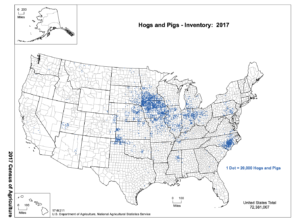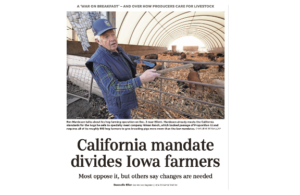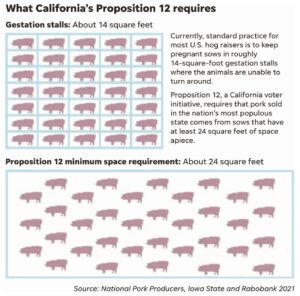As a result of the attack on Iran, nitrogen fertilizer at the port of New Orleans has seen an increase in price this week. Urea prices for barges in New…
Court Delays California Pork Rule Enforcement
Earlier this week, Reuters writer Tom Polansek reported that, “A California court said it will delay enforcement of part of a law aimed at ensuring more humane treatment of farm animals, which opponents warned could lead to pork shortages and higher food prices in the most populous U.S. state.
“Supporters of Proposition 12, approved by California voters in November 2018, say it will make food production more humane by setting minimum space requirements for breeding pigs, egg-laying hens and calves raised for veal.
“The law, which took effect on Jan. 1, also forbids the sale of pork, eggs or raw veal from animals enclosed in too little space. Breeding sows are often kept in crates that do not allow them to turn around or stand up.”
Polansek explained that,
Judge James Arguelles of California Superior Court in Sacramento County ruled on Monday, however, that grocers, restaurants and retailers would not be subject to enforcement of the new restrictions on whole pork meat sales until six months after the state enacts final regulations.
The Reuters article stated that, “The California Department of Food and Agriculture said on Tuesday it and the attorney general’s office are evaluating the ruling. Pork producers and suppliers remain subject to enforcement if they violate square-footage requirements that went into effect on Jan. 1, the department said.
“‘It’s a little bit of a hollow victory for the grocers because they get their product from suppliers and those suppliers have to comply with Prop 12,’ said Wayne Pacelle, president of the animal-welfare group Animal Wellness Action.”
DTN writer Todd Neeley reported on Tuesday that, “A California court halted the enforcement of Proposition 12 on Monday, moving back enforcement of the animal-welfare law to six months after rules are finalized.
“The California Department of Food and Agriculture is more than two years late in finalizing rules for the law that places animal-welfare restrictions on pork producers who sell products in the state.”
The DTN article added that, “In addition, the Supreme Court continues to delay a decision on whether to consider a petition on Proposition 12 filed on behalf of the National Pork Producers Council. Though the court issued orders on Monday that included accepting a petition on the Clean Water Act and other cases while denying other petitions, the court did not accept or deny the NPPC challenge.”
And Associated Press writer Christopher Weber reported this week that, “California is the nation’s largest market for pork, and producers in major hog states like Iowa provide more than 80% of the roughly 255 million pounds (115 million kilograms) that California’s restaurants and groceries use each month, according to Rabobank, a global food and agriculture financial services company.”

Bloomberg writers Michael Hirtzer and Kim Chipman reported on Tuesday that, “Hog futures surged following a court-ordered delay to California’s Proposition 12 rule, intended to provide more humane conditions by giving farm-raised pigs more living space.”
“Chicago hogs climbed as much as 2.2% Tuesday, hitting 97.375 cents per pound, the highest since July,” the Bloomberg article said.

Meanwhile, Des Moines Register writer Donnelle Eller reported on the front page of Sunday’s paper that, “Iowa farmer Mike Paustian says he would need to spend hundreds of thousands of dollars to overhaul his hog operation to qualify to sell pork in California.”
Eller pointed out that,
But the effect of the Jan. 1 deadline falls most heavily on pork producers About 30% of U.S. egg producers already comply with California’s prohibition on caging laying hens. But less than 5% of hog operations can meet Proposition 12’s requirement that a pregnant sow has at least 24 square feet of space to move around in.
“California officials estimate each of the state’s consumers will spend $50 more a year for food because of the initiative,” the Register article said.

Sunday’s article noted that, “Pork producers and meatpackers have had three years to meet the requirements, [Josh Balk, vice president of farm animal protection for the Humane Society] said, and companies like Tyson, Hormel and Perdue Farms plan to do so — though some others, like Seaboard Foods, are responding by limiting their California pork sales.”





